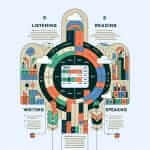As an IELTS instructor with over two decades of experience, I often encounter students who are fascinated by past IELTS topics, hoping to decipher patterns or predict future trends. One such topic that frequently piques curiosity is “How the unemployed spend their time UK 1982 Cambridge IELTS.” While it’s true that past topics can offer valuable insights into the exam’s structure and common themes, it’s crucial to approach them strategically. This article delves into the significance of understanding such topics, provides tips on discussing them effectively, and cautions against unproductive preparation methods.
The Significance of Past IELTS Topics
Analyzing past IELTS topics like “How the unemployed spend their time UK 1982” can be beneficial for several reasons:
1. Understanding Exam Trends and Themes
Examining past topics allows you to identify recurring themes and patterns in IELTS questions. You might notice a focus on social issues, economic trends, or cultural changes over time. Recognizing these themes can provide valuable context for your preparation.
2. Expanding Your Vocabulary
Past topics often introduce specific vocabulary related to the subject matter. For instance, discussing unemployment might involve terms like “job seekers,” “redundancy,” “retraining programs,” or “social welfare.” Familiarizing yourself with this vocabulary can enhance your fluency and accuracy during the Speaking test.
3. Developing Critical Thinking Skills
Analyzing past topics encourages you to think critically about different perspectives and arguments. For example, when considering “How the unemployed spend their time,” you might explore factors like age, location, socioeconomic background, and access to resources. This analytical approach is crucial for achieving a high band score in the IELTS Speaking test.
 Unemployment in the UK 1982
Unemployment in the UK 1982
Discussing “How the Unemployed Spend Their Time” Effectively
While the specific topic of “How the unemployed spend their time UK 1982” is unlikely to reappear in its exact form, it offers valuable practice material for discussing related themes. Here’s how you can approach such topics effectively:
1. Focus on General Trends and Insights
Instead of memorizing specific details from 1982, focus on extracting broader insights. For instance, you could discuss the potential impact of unemployment on individuals’ mental health, social connections, or future career prospects.
2. Draw Parallels to Contemporary Society
Connect the historical context to present-day issues. Discuss how the ways in which unemployed people spend their time might have changed with technological advancements, shifts in the job market, or evolving social attitudes.
3. Support Your Ideas with Evidence
When discussing this topic, avoid making generalizations. Instead, support your points with relevant examples or evidence. You could draw upon your knowledge of current events, social studies, or personal experiences.
A Word of Caution: Avoiding Unproductive Preparation
While analyzing past topics can be helpful, it’s essential to avoid unproductive preparation methods:
1. Don’t Memorize Answers
The IELTS exam is designed to assess your ability to communicate effectively in English, not your capacity for rote memorization. Memorizing answers from past topics will hinder your ability to think critically and respond naturally to new prompts.
2. Focus on Developing Essential Skills
Instead of fixating on specific topics, prioritize developing essential IELTS skills such as vocabulary building, grammar accuracy, fluency, and pronunciation. These skills are transferable to any topic and will serve you well in the long run.
Conclusion
While the specific topic of “How the unemployed spend their time UK 1982” may not directly appear in your IELTS exam, understanding its significance and utilizing it as a springboard for broader discussions can be beneficial. Remember to focus on extracting general trends, connecting them to contemporary society, and supporting your ideas with evidence. Ultimately, prioritize developing your overall English language proficiency and critical thinking abilities to excel in the IELTS exam.


